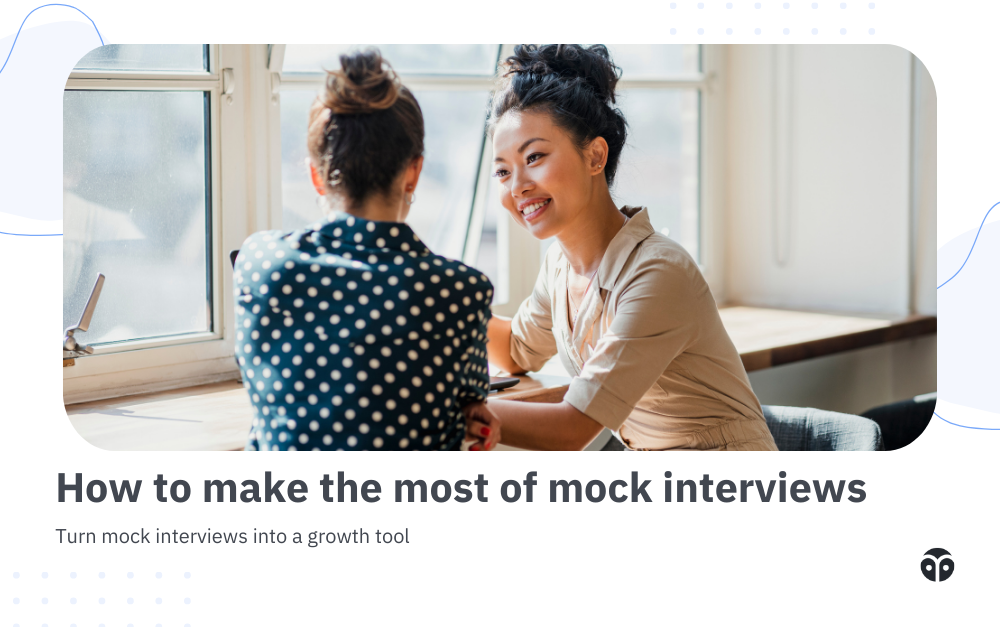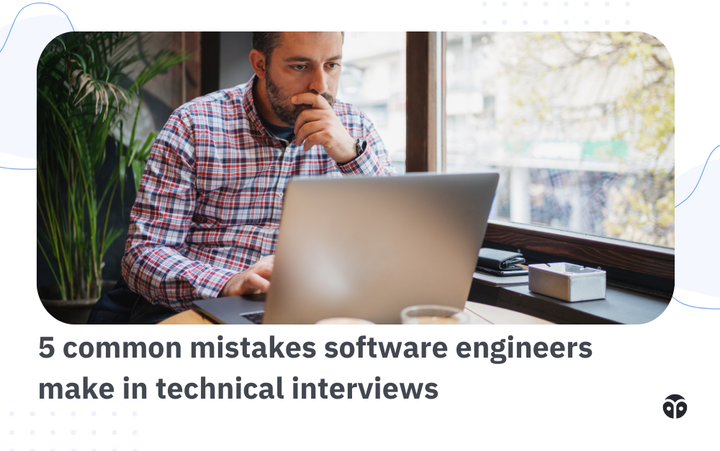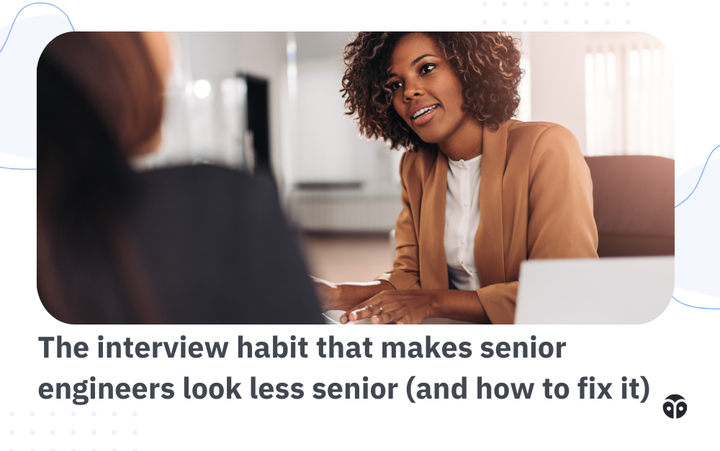How to make the most of mock interviews
Mock interviews reveal weaknesses but don’t improve skills on their own. Learn how to use them effectively by targeting gaps, improving between sessions, and structuring practice for real progress.

Mock interviews are one of the best ways to benchmark your interview readiness. They simulate the real-world interview experience, giving you a sense of how you perform under pressure, what kinds of questions you might face, and how your skills stack up against expectations.
But mock interviews alone won’t make you a better candidate.
Many people mistakenly treat mock interviews as practice, but they are actually an evaluation tool. They reveal your strengths and weaknesses, but they don’t actively help you improve. If you’re repeatedly taking mock interviews without making meaningful adjustments in between, you’re likely not getting the most out of them.
Here’s how to use mock interviews effectively and what to do between them to make real progress.
Mock interviews are a diagnostic tool, not a practice space
Think of mock interviews like a diagnostic test. Their main value is identifying what you know, where you struggle, and how you react under pressure. But taking multiple mocks back-to-back without addressing deficiencies is like retaking the SAT without studying — it’s unlikely to lead to meaningful improvement.
If you walk away from a mock interview with feedback about weak areas, your next step shouldn’t be to schedule another mock and hope for a better outcome. Instead, you need to focus on targeted skill-building before attempting another one.
Don’t rely on mock interviews for practice
Many people take mock interviews too frequently, thinking the more they do, the better they’ll perform. But if you aren’t deliberately working on the weaknesses they expose, you’re just reinforcing bad habits.
A better approach is to:
- Use mock interviews to assess your skills. Approach them as a tool for gathering insight, not as a workout where you build new abilities.
- Identify specific gaps. Note where you struggled, whether it’s technical knowledge, problem-solving speed, or communication.
- Focus on structured practice before scheduling another mock. Invest time in improving your weak areas so that your next mock isn’t just a repeat of the last one.
The key to improvement isn’t doing more interviews — it’s doing the right kind of preparation between them.
Once you’ve completed a mock interview, your goal is to act on the feedback you receive. Here’s how to turn that feedback into real progress.
1. If you struggled with a specific technical topic
Let’s say you struggled with binary trees in a data structures and algorithms interview or scaling strategies in a system design interview. Your instinct might be to schedule another mock, hoping the next one goes better.
That’s the wrong approach.
If you haven’t put in additional practice, nothing has changed between mocks. You’re just rolling the dice, hoping the next interview covers a topic you know better. Even if you pass by luck, the underlying weakness remains — and will likely be exposed in a real job interview.
A better strategy:
- Take time to deepen your understanding of the weak topic by reviewing foundational concepts.
- Work through practice problems that target the specific concept you struggled with.
- Use spaced repetition to reinforce knowledge over time, rather than cramming just before your next mock.
The goal is not just to get through the next interview but to ensure that the topic is a long-term strength.
2. If you need to improve communication while problem-solving
Many candidates hear feedback like: "You understand the concepts well, but you need to communicate your thought process more clearly."
This is one of the most common issues in technical interviews. Strong candidates explain their approach, justify trade-offs, and walk the interviewer through their thinking.
If you struggle with this, mock interviews alone won’t help. You need real-time feedback and coaching to refine how you communicate.
A better strategy:
- Practice speaking aloud as you solve problems. Verbalizing your thoughts, even when working solo, helps build the habit of structured communication.
- Work with a peer or mentor. Get feedback on how well you articulate your thought process.
- Join group practice sessions. Watching others solve problems and explain their reasoning can help you identify effective communication patterns.
Strong technical skills alone won’t get you the job — effective communication can be the deciding factor.
3. If you struggle with time management
If your feedback suggests you take too long to solve problems, you need to optimize how you approach problems. Many candidates assume that finding solutions faster just means practicing more, but it’s actually about improving problem-solving efficiency.
A better strategy:
- Break problems into structured steps. Instead of diving straight into coding, clarify requirements, outline your approach, and identify edge cases first.
- Identify where you’re losing time. Are you struggling with syntax, debugging, or coming up with an initial plan? Recognizing the bottleneck helps you improve faster.
- Time yourself while practicing. Set limits for problem-solving stages (e.g., 5 minutes for planning, and 15 minutes for coding) to build efficiency.
Speed comes from structure, not just repetition.
The right way to use mock interviews
Mock interviews should be part of your preparation strategy, but not the only part. Here’s how to integrate them effectively:
- Use mock interviews to diagnose weaknesses.
- Treat each session as a learning opportunity, not just a test.
- After each mock, reflect on what needs improvement.
- Did you struggle with a specific topic? Communication? Time management?
- Invest time in structured practice before scheduling another mock.
- Work on closing skill gaps rather than immediately jumping into another interview.
- Reassess your progress with another mock.
- Once you’ve improved, take another mock interview to evaluate progress under real conditions.
By thinking about mock interviews this way, you ensure that each one actually moves you forward, rather than just repeating the same mistakes in a new setting.
Preparation yields the best results
The candidates who improve the fastest aren’t the ones taking the most mock interviews — they’re the ones making the best use of their time between mocks.
A great interview performance doesn’t happen by accident. It’s the result of deliberate practice, targeted skill-building, and structured preparation. Mock interviews provide valuable insights, but they only translate into real progress when paired with intentional improvement strategies.
So before you schedule your next mock, ask yourself:
- What am I trying to measure?
- What have I done to improve since my last mock?
- Will this mock interview actually test progress, or am I just hoping for a better result?
The best candidates go beyond practicing for interviews — they prepare for them. And that makes all the difference.
Get holistic interview prep with Formation
The Formation Fellowship gives mid-level and senior engineering job seekers everything they need to land their dream roles—including personalized skill brush-ups, resume help, unlimited mock interviews with experienced software engineers and hiring managers from top-tier tech companies, career and negotiation support, and more.
If you’re having trouble navigating your job search on your own, apply here and get unconditional support from a team of engineering mentors, technical recruiters, career coaches, and more.



